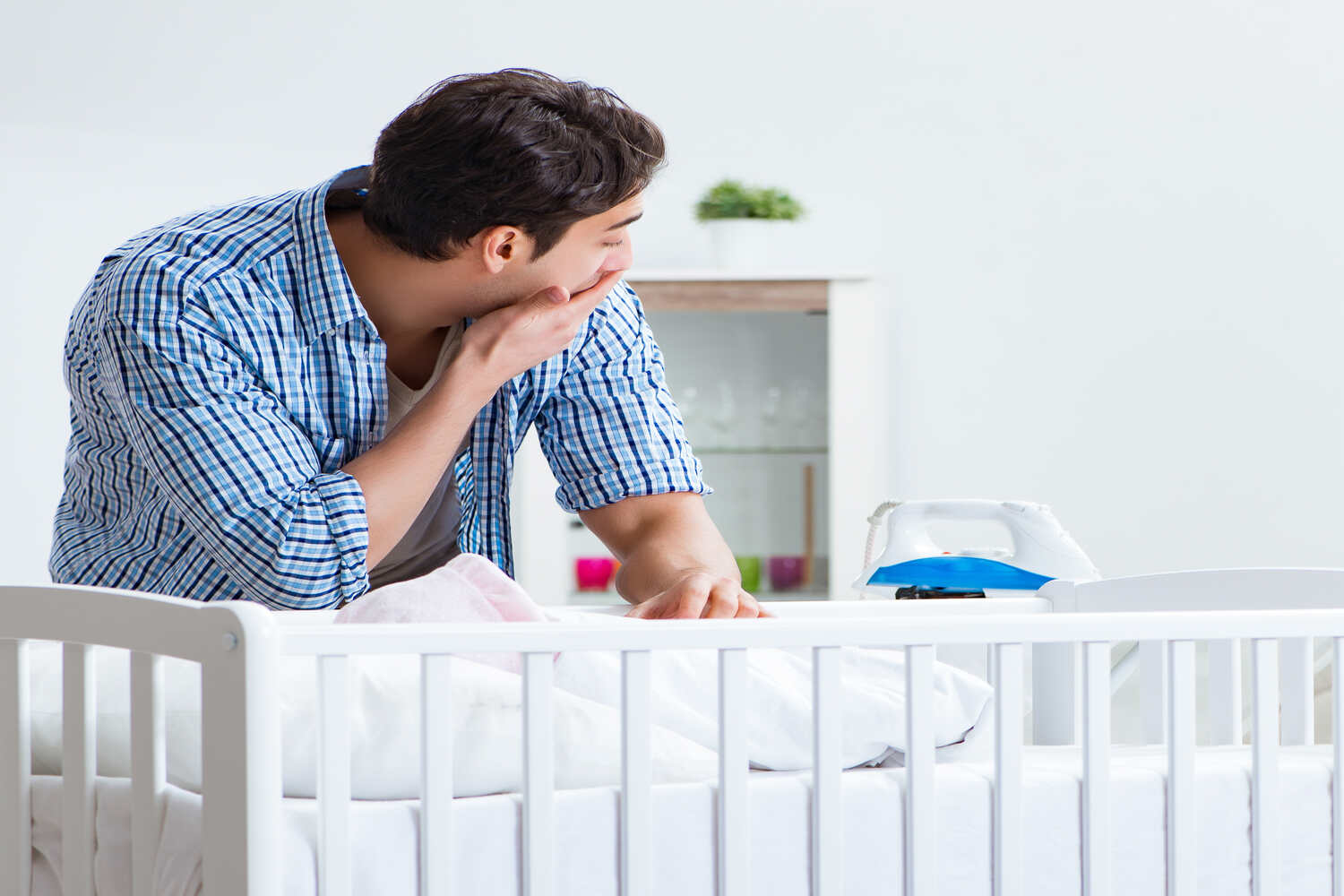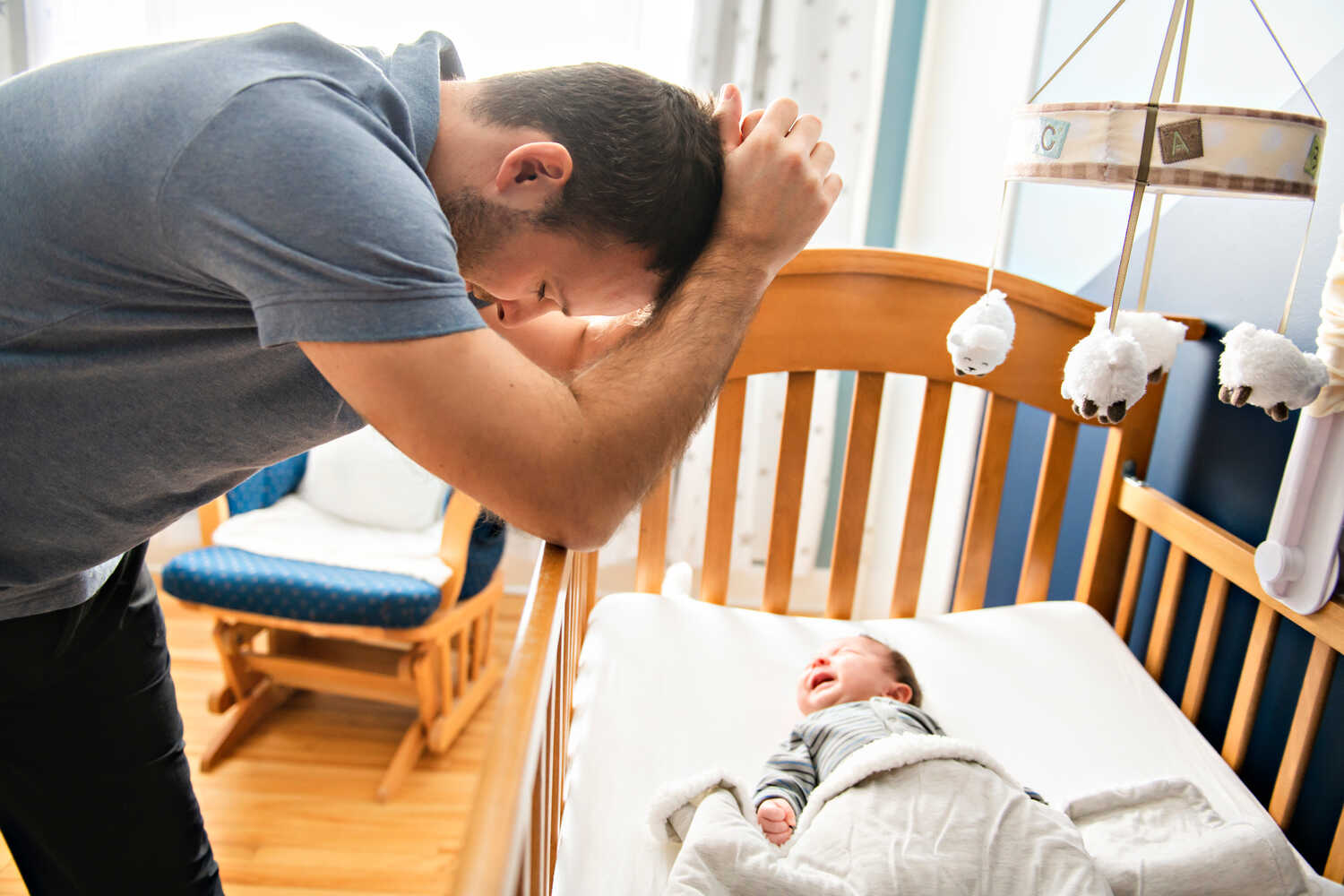
Paternal postnatal depression is not much talked about when it comes to discussing the mental health needs of expecting parents. The issues that the expecting father goes through are often unnoticed. However, it is a significant mental health concern. Many new fathers may undergo a state of turmoil after the arrival of their baby but this is often less talked about and discussed due to the social stigma attached to it.
The emotional challenges that most fathers face after the birth of their baby may include mood swings, persistent irritability, and overthinking. This article aims to dive deep into the emotional landscape of new dads. It is important to lessen their suffering and take some proactive measures to ensure the holistic good health of the couple.
In This Article
- What Is Paternal Postnatal Depression?
- Causes of Paternal Postnatal Depression
- Symptoms of Postnatal Depression in New Dads
- Risk Factors For Paternal Postpartum Depression
- How To Identify Paternal Postnatal Depression?
- Are There Any Treatment Options For Paternal Postnatal Depression?
- How To Help a Dad Cope With Postnatal Depression?
- When To Consult A Doctor?
- FAQ’s
What Is Paternal Postnatal Depression?
Paternal postnatal depression or PPND is an episode of depressive behavior that a new father may experience after the birth of his baby. Postnatal depression is not a woman’s domain after all. There are new fathers out there who go through emotionally overwhelming tendencies of sadness after their baby is born (1).
Research findings have revealed that paternal postnatal depression is a common psychiatric problem. It occurred in 1.2% – 25.5% of men globally during the covid-19 pandemic (2).
Other studies related to this domain emphasized different numbers. It showed that 1 in 10 new fathers experiences paternal postnatal depression along with anxiety symptoms. Sometimes, mental health issue raises concerns such as restricted emotional display, low energy, and lack of interest in daily chores (1A).
New dads experience it more often, probably because of the insecurity about the added responsibilities at home, or the immediate life changes that appear overwhelming to them. Sometimes, the symptoms start when their wives are pregnant, or it can also start showing up anytime in the first year of childbirth.
Causes of Paternal Postnatal Depression

The true cause of paternal depression is still unknown. There is no valid explanation as to why some dads are affected by this while others are not.
The birth of a baby can be a demanding experience for the new dad. However, not everyone suffers from this condition.
Sometimes, postnatal depression in men can be more prominent if they already suffer from some psychiatric illness such as major depression or anxiety (1B). Additionally, some probable reasons can increase the chances of developing paternal postnatal depression (PPND).
- Fatherhood pressure and related responsibilities
- Added financial pressures
- Alteration in lifestyle
- Lack of wife’s attention
- Changes in marital relationship chemistry
- Enhanced domestic workload
- Lack of proper sleep
These factors can all add up to the surmounting paternal depression and can affect a new dad’s health and wellness.
Symptoms of Postnatal Depression in New Dads
In most cases, the symptoms of paternal postnatal depression are similar to that of a woman. However, some subtle variations are seen. Most men show mood irritability, poor decision-making, and impulsive tendencies as opposed to sadness as seen in women.
Moreover, acts of violence, anger outbursts, and persistent episodes of frustration are common in men but not among women.
Most men respond to fatherhood differently. Consequently, the symptoms also vary. They may also show physical signs of their illness; such as headaches, stomach issues, loss of appetite, muscle pains, and even substance abuse to a certain extent. Some of the common symptoms of postnatal depression are as follows
- Feeling sad, isolated, anxious, baffled, or overwhelmed by their feelings and the reaction of their partner toward their feelings
- Becoming irritated, hostile, and aggressive
- Playing less with their babies
- Feeling disheartened, lack of appetite, bad concentration, improper sleep, and worrying at night
- Perceiving the future in a miserable bleak way and worrying too much about the future
- Avoiding friends and not socializing with others
- Experiencing aches and pains without any reason
- Showing no interest in sex
- Performing poorly at work
- Feeling exhausted and drained
- Disturbances in appetite
- Undue weight loss or weight gain
Risk Factors For Paternal Postpartum Depression

Numerous factors can lead to paternal postnatal depression. Fathers with pre-existing mental illnesses or those with a conflicting married life may give birth to kids with serious psychological problems in childhood (3). Their already unhappy state of mind, coupled with irritability can increase the chance of developing this kind of depression.
Furthermore, study findings have also revealed that poor marital quality leads to loneliness and sadness, resulting in recent illness and poor immunity (4). It means that psychological distress is a leading factor in paternal postnatal depression.
Generally, the common risk factors associated with this depression include
1. Sleep deprivation
Lack of sleep for first-time dads overwhelms them mentally and can make them feel irritable and angry
2. Unintended Pregnancy
An unplanned pregnancy can overwhelm them due to thoughts of additional responsibilities coming ahead.
3. Unsettled baby
A cranky and restless baby can be a risk factor. It stresses out the new dad instantly who may not be aware of how to handle the situation.
4. Maternal Postpartum Depression
A new mother experiencing PPD can also be a risk factor for the father to develop the mental disorder. Seeing his sad and anxious wife can depress the new father in no time.
5. Age
Young ads are more likely to suffer from depression and anxiety as compared to their elderly counterparts due to factors such as lack of experience and unpreparedness.
6. Finances
First-time dads who are not economically sound are susceptible to experiencing PPND
Besides these, dad’s own social factors, personality, family history, and previous ‘mental health’ history are also important in affecting his chances of getting PPND.
How To Identify Paternal Postnatal Depression?
While trying to identify paternal postnatal depression, it is important to note the red flags that appear in a man’s behavior once he becomes a father.
These behavioral and emotional changes need to be considered to understand the patterns and thereby be considered for a clinical assessment by a mental health professional. Some of the most obvious signs include (1C)
- Persistent mood changes
- Anger without any immediate trigger
- Frustration almost with anything and everything happening around
- Lack of patience
- Sleep disorders. either insomnia or sleeping too much
- Lack of bonding with the baby
- Feelings of negativity towards oneself
- Self-doubt
- Persistent tiredness, either physically or mentally, or both
Are There Any Treatment Options For Paternal Postnatal Depression?

Paternal Postnatal depression has not been researched thoroughly. Therefore, we do not have the best-fit treatment. However, some of the most accepted lines of treatment include medication and psychotherapy.
These techniques are meant to be given depending upon the individual case history and illness timeline of the sufferer.
a. Cognitive Behavior Therapy (CBT)
This therapy aims to change the dad’s negative thoughts into positive ones. This is usually done by helping the dad identify all the good things about fatherhood and then helping them weigh these benefits with the struggles of daily life that they’re facing.
It also teaches new dads healthy ways to cope with anxiety and bad mood. Study findings support the efficacy of this therapy in treating paternal postnatal depression (5).
b. Interpersonal Therapy
This is a type of relationship therapy where the dad is taught the various ways to mend his relationship with his spouse. The therapy aims to correct the dysfunctions in relationships that can contribute to sad mood, anxiety, and poor decision-making style.
c. Supportive Therapy
This therapy is meant to find good family support for the new dad. It could be any other family member or the spouse herself who can share responsibilities and make the father feel happy about his fatherhood. This is possible through open communication, empathy, and appreciation of the new dad’s role in rearing the baby.
How To Help a Dad Cope With Postnatal Depression?
Here are some self-help ideas that can positively aid in overcoming postnatal depression
- Give some time to yourself away from work and family
- Focus on the memorable moments of being a parent
- Discuss parenthood with other new dads
- Spend some time enjoying your favorite pastime
- Discuss your baby’s activities with your spouse- this will improve your relationship with your spouse too
- Realize that postnatal depression in fathers is not uncommon; after all, you’re a human
- Share your responsibilities at home with trusted members, whether it is about looking after the newborn or any financial aspects.
When To Consult A Doctor?

A doctor should be consulted if the new dad experiences a lot of anxiety and persistent sadness in his daily life. Moreover, signs such as uncontrolled anger, overthinking, and lack of interest in daily activities should also call for treatment. Therefore, seeking medical advice is a must at this stage for timely treatment.
Paternal postnatal depression can be a challenging experience. However, awareness, careful understanding about the needs and the requirements of the child, and mutual compassion and cooperation can prove to be extremely helpful in dealing with this sensitive phase.
FAQ’s
1. Can Dads Suffer From Postnatal Depression?
Yes, dads may suffer from postnatal depression; though not all dads. Their emotional world is full of persistent sadness and anxiety, with episodes of anger and poor decision-making. Moreover, timely treatment is possible. It can address the thoughts that trigger these emotions and bring back mental well-being.
2. How To Identify That a New Dad Is Depressed?
Knowing depression signs in a new dad is not difficult. It can be identified by observing behavior changes and persistent bad moods. Signs like social isolation, sleep issues, loss of appetite, and anxiety can easily help identify the problem.
3. How To Help A New Dad Suffering from Postnatal Depression?
Helping a new dad cope with the challenges of parenting includes proper self-care. It also requires taking support from other family members. New dads should seek therapy or counseling if signs of illness persist for a longer time than usual.
References
- Postpartum Depression in Men – PMC – [https://www.ncbi.nlm.nih.gov/pmc/articles/PMC6659987/]
- Paternal postnatal depression and associated factors: Community-based cross-sectional study – PMC
- The effects of pre- and postnatal depression in fathers: a natural experiment comparing the effects of exposure to depression on offspring – PMC – [https://www.ncbi.nlm.nih.gov/pmc/articles/PMC2737608/]
- Marital discord and immunity in males – PubMed – [https://pubmed.ncbi.nlm.nih.gov/2838864/]
- Interventions for Perinatal Depression and Anxiety in Fathers: A Mini-Review – PMC – [https://www.ncbi.nlm.nih.gov/pmc/articles/PMC8810528/]

